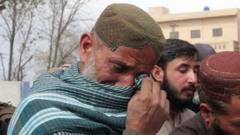"In a shocking incident, the Jaffar Express train in Pakistan was hijacked by armed militants, leading to a lengthy siege. Passengers shared chilling experiences as gunfire erupted and rescue operations unfolded, resulting in several casualties and ongoing uncertainty about missing individuals."
"Survival Stories from the Jaffar Express: Train Hijacking in Pakistan Shakes Nation"

"Survival Stories from the Jaffar Express: Train Hijacking in Pakistan Shakes Nation"
"Eyewitness accounts reveal harrowing details of the Balochistan train siege that left passengers stranded and fearful for their lives."
On Tuesday, around 440 passengers were on board the Jaffar Express when chaos erupted near the Bolan Pass in Balochistan, Pakistan. The train was interrupted by a violent explosion, followed by intense gunfire from armed militants who subsequently stormed the carriages. Eyewitness Mehboob Hussain recounted the terrifying moments as they were ambushed while traveling from Quetta to Peshawar.
The attackers, identified as members of the Balochistan Liberation Army (BLA), bombed the railway tracks and began firing indiscriminately at the train. The BLA claimed responsibility for the hijacking, demanding the release of Baloch political prisoners within 48 hours. This group's history of armed insurgency against the state has culminated in numerous violent incidents, but this marks the first time they targeted a passenger train.
The siege continued for over 30 hours, resulting in the rescue of 300 passengers, albeit at a heavy cost; reports indicate 33 militants, 21 civilians, and four military personnel were killed during the ordeal. Eyewitness accounts described scenes of horror, with passengers caught in crossfire and frantic attempts to escape.
A railway police officer on the train recounted his struggle to protect passengers as militants closed in. With limited ammunition and overwhelming numbers, he and his colleagues fought valiantly against the intruders, but their efforts were ultimately futile.
Throughout the ordeal, militants separated hostages by ethnicity, threatening further violence if their demands were not met. Some passengers, including women and children, were released, while others remained trapped. Noor Muhammad, one of the survivors, narrated how he and his wife narrowly escaped after being forced off the train.
As night fell, alarm and desperation grew among those still aboard. Intense gunfire punctuated the silence, turning moments into hours of fear. The situation escalated again when military forces launched a rescue operation during morning prayers, which provided an opportunity for some to break free amidst the chaos.
Survivors recalled harrowing moments, including witnessing the deaths of fellow passengers. Many fled into the surrounding wilderness, facing both physical exhaustion and emotional trauma. Authorities confirmed that while 300 hostages were freed, the fate of roughly 140 others remained unclear.
Military operations continued in the aftermath, with a commitment to bring those responsible to justice. As the nation grapples with the implications of this violent event, the resilience of survivors like Noor Muhammad highlights the human spirit's capacity for hope even in the darkest of times.





















